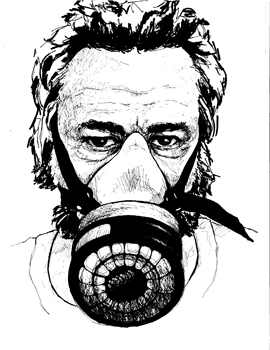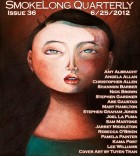The thing that struck me about this story is how Chase is all of these ages at the same time, and how you show this so effectively. Did this idea inspire the story or grow from it?
The depths of non-linear time didn’t inspire the story, but it was my starting point once the idea was there. I wanted to freeze the moment of Chase’s being caught eating the chocolate and fuse this scene with every moment of his life. At first, before the story made the leap from thoughts to the page, Chase was caught by his father; but this version of abuse never materialized on paper.
The inspiration for the story came from my research into the ingredients of chocolate products. I’m one of those people who has to know exactly what I’m eating.
Can you say any more about the creative process that takes you from hard fact (chocolate ingredients) to a surrealist perspective?
I wanted Chase’s prayer to reflect his obsession with ingredients (and I suppose my own), and I needed to reduce this prayer to its barest form. Surrealism allows a writer to break a concept down and piece it back together so that the pieces no longer make up the whole as they did before. Prayer and people can be reduced to lists of ingredients so that the reader is obliged to interact with the concept (of prayer and people) in a new way.
In your recent interview with Gay Degani for Flash Fiction Chronicles, you say, “The importance of true surrealist writing—as opposed to merely writing weird—is it allows me to find the hidden stories in myself.” This process fascinated me. Can you say more about it?†
First, thank you for reading that interview. As I said above, “When Chase Prays Chocolate” appeared as I was reading up on the ingredients of your average chocolate candy bar. The surreal element of the story is Chase’s prayer, which is his supplication to be pure and innocent: to go back to that moment of eating the Baker’s chocolate from the third kitchen shelf when he was five. The purest form of chocolate has only two ingredients (chocolate liquor and soy lecithin), which meant I would be meeting a character obsessed with purity and troubled by the seemingly never-ending list of human ingredients.
The hidden story in myself: As a child, I was never caught eating the Baker’s chocolate in our kitchen, but “When Chase Prays Chocolate” did help me recover the moment of finding it and eating it. We didn’t usually have sweets in the house, so that Baker’s chocolate was a bitter indulgence. Since my mother rarely baked, it was all mine.
You mention having a “travel tic.” Any upcoming (or current) travel plans?
It is a tic. It’s like an itch that won’t calm down until I’ve seen every inch of the planet. I have a fat folder of flight confirmations. Sadly, my latest plan to fly to Japan for ten days fell through due to an illness in the family, but Japan will be there next year too. In the middle of June, I’ll be in Stockholm for a few days, and then at the end of June—around the time this story comes out—I’ll be in New York City for the Fictionaut reading and party.
For the last three years, I’ve documented my little obsession with planet Earth on my blog I Must Be Off!
Your blog features a log of photos, with each one providing a link to a written entry.
I’ve chosen to make I Must Be Off! unignorably visual because I love color. Photography has been a distraction of mine for a few years now. I take hundreds of pictures every time I travel—and when I say hundreds, I mean 400 to 500. Every time. I try to delete the boring, the blurry and the bad (shots of myself: vanity), but I usually end up with around 400. It’s my number, I guess.
I Must Be Off! goes against all the rules of blogging. As a blogger, I’m supposed to do ONE thing so that my readers can slot me into a category: he’s a literary blogger, he’s a travel blogger, he’s a gluten-free blogger, he’s a photoblogger, he’s an expat blogger. Well, I’m an expat, gluten-free photo-literary travel blogger . . . so you’ll know where my hands have been. I don’t really have the energy to be something different to everyone—although, apparently, I have the energy to be everything to everyone.
You seem to have an interest in expat writers.
I do. I’m one myself of course. Being an expat can be lonely. Being a writer can be lonely. Being an expat writer, especially if you’re an expat in a country where the official language isn’t your mother tongue, can be like solitary confinement. Your writing community is usually online.
I love featuring expat writers on I Must Be Off! These are interesting people with inspiring life stories. One of my favorites is Paola Fornari Hanna, a Tanzanian-born writer living now in Dhaka, Bangladesh. Her appreciation for the people she meets around the world fascinates me.



 The SmokeLong Grand Micro Contest (The Mikey) is now an annual competition celebrating and compensating the best micro fiction and nonfiction online.
The SmokeLong Grand Micro Contest (The Mikey) is now an annual competition celebrating and compensating the best micro fiction and nonfiction online.